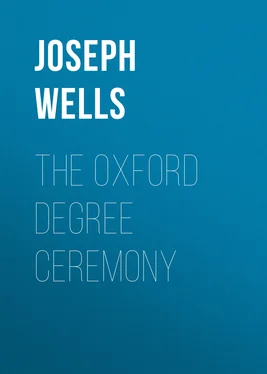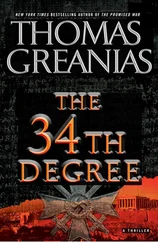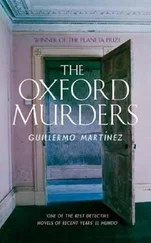Joseph Wells - The Oxford Degree Ceremony
Здесь есть возможность читать онлайн «Joseph Wells - The Oxford Degree Ceremony» — ознакомительный отрывок электронной книги совершенно бесплатно, а после прочтения отрывка купить полную версию. В некоторых случаях можно слушать аудио, скачать через торрент в формате fb2 и присутствует краткое содержание. Жанр: foreign_antique, foreign_edu, на английском языке. Описание произведения, (предисловие) а так же отзывы посетителей доступны на портале библиотеки ЛибКат.
- Название:The Oxford Degree Ceremony
- Автор:
- Жанр:
- Год:неизвестен
- ISBN:нет данных
- Рейтинг книги:5 / 5. Голосов: 1
-
Избранное:Добавить в избранное
- Отзывы:
-
Ваша оценка:
- 100
- 1
- 2
- 3
- 4
- 5
The Oxford Degree Ceremony: краткое содержание, описание и аннотация
Предлагаем к чтению аннотацию, описание, краткое содержание или предисловие (зависит от того, что написал сам автор книги «The Oxford Degree Ceremony»). Если вы не нашли необходимую информацию о книге — напишите в комментариях, мы постараемся отыскать её.
The Oxford Degree Ceremony — читать онлайн ознакомительный отрывок
Ниже представлен текст книги, разбитый по страницам. Система сохранения места последней прочитанной страницы, позволяет с удобством читать онлайн бесплатно книгу «The Oxford Degree Ceremony», без необходимости каждый раз заново искать на чём Вы остановились. Поставьте закладку, и сможете в любой момент перейти на страницу, на которой закончили чтение.
Интервал:
Закладка:
This form also is old, but has been cut down from its former fullness; e.g. in the Laudian Statutes the candidate was admitted, among other things, to 'read a certain book of the Logic of Aristotle'. The B.A.s, when admitted, are allowed to disperse as they please, and the ceremony is over. It is unfortunate that the form of admission to the degree which is most frequently taken, and which (speaking generally) is the most real degree given, should be such an unsatisfactory and bare fragment of the old ceremonial.
Degrees in Absence and Incorporations.
It may be noticed that degrees 'in absence' are announced by the Vice-Chancellor after each set of degrees has been conferred, e.g. an 'absent' M.A. is announced after the M.A.s have made their bow. The University only allows this privilege to those who are actually out of the country, and to them only on stringent conditions; an extra payment of £5 is required.
The proceedings terminate sometimes with the admission to 'ad eundem' rank at Oxford, of graduates of Cambridge or of Dublin; this privilege is now rarely granted, though it was once freely given. When all is over, the Vice-Chancellor rises, announces 'Dissolvimus hanc Congregationem', and solemnly leaves the building in the same pomp and state with which he entered.
CHAPTER II
THE MEANING OF THE DEGREE CEREMONY
The Oath of the M.A.
For the last 500 years certainly, for nearly 200 longer probably, the candidate presented for 'inception' in the Faculty of Arts (i.e. for the M.A. degree) has sworn that he will observe the 'statutes, privileges, customs and liberties' of his university. 7 7 The form is found in the two 'Proctors' books', of which the oldest, that of the Junior Proctor, was drawn up (in 1407) by Richard Fleming, afterwards Bishop of Lincoln and founder of Lincoln College; but it was then already an established form, and probably goes back to the thirteenth century, i.e. to the reign of Henry III.
It is difficult to know what the average man now means when he hurriedly says 'Do fidem' after the Junior Proctor's charge; but there is no doubt that when the form of words was first used, it meant much. The candidate was being admitted into a society which was maintaining a constant struggle against encroachments, religious or secular, from without, and against unruly tendencies within. And this struggle gave to the University a vivid consciousness of its unity, which in these days of peace and quiet can hardly be conceived.
What is a University?
The essential idea of a university is a distinctly mediaeval one; the Middle Ages were above all things gifted with a genius for organization, and men were regarded, and regarded themselves, rather as members of a community than as individuals. The student in classical times had been free to hear what lectures he pleased, where he pleased, and on what subjects he pleased, and he had no fixed and definite relations with his fellow students. There is little or no trace of regular courses of study, still less of self-governing bodies of students, in the 'universities' of Alexandria or Athens.
But with the revival of interest in learning in the eleventh and twelfth centuries, the real formation of universities begins. The students formed themselves into organized bodies, with definite laws and courses of study, both because they needed each other's help and protection, and because they could not conceive themselves as existing in any other way.
These organized bodies were called 'universitates' 8 8 It is perhaps still necessary to emphasize the fact that the name 'University' had nothing to do with the range of subjects taught, or with the fact that instruction was offered to all students; the latter point is expressed in the earlier name 'studium generale' borne by universities, which is not completely superseded by 'universitas' till the fifteenth century.
, i.e. guilds or associations; the name at first had no special application to bodies of students, but is applied e.g. to a community of citizens; it was only gradually that it acquired its later and narrower meaning; it finally became specialized for a learned corporation, just as 'convent' has been set apart for a religious body, and 'corps' for a military one.
The origin of Oxford University.
When these organized bodies were first formed is a question which it is impossible to discuss at length here, nor could a definite answer be given. The University of Oxford is, in this respect, as in so many others, characteristically English; it grew rather than was made, like most of our institutions, and it can point to no definite year of foundation, and to no individual as founder. Here it must suffice to say that references to students and teachers at Oxford are found with growing frequency all through the twelfth century; but it is only in the last quarter of that century that either of those features which differentiate a university from a mere chance body of students can be clearly traced. These two features are organized study and the right of self-government.
The first mention of organized study is about 1184, when Giraldus Cambrensis, having written his Topographia Hibernica and 'desiring not to hide his candle under a bushel,' came to Oxford to read it to the students there; for three days he 'entertained' his audience as well as read to them, and the poor scholars were feasted on a separate day from the 'Doctors of the different faculties'. Here we have definite evidence of organized study. Much more important is the record of 1214 (the year before Magna Carta 9 9 The coincidence is not accidental. Magna Carta was wrested from a king humiliated by his submission to the Pope, and the University Charter was given to redress an act of violence on the part of the Oxford citizens, who had been stimulated in their attack on the 'clerks' of Oxford by John's quarrel with the Pope.
), when the famous award was given by the Papal Legate, which is the oldest charter of the University of Oxford. In this the 'Chancellor' is mentioned, and we have in this office the beginnings of that self-government which, coupled with organized study, may justify us in saying that the real university was now in existence. It is quite probable that the first Doctor of Divinity whom we find 'incepting' in Oxford, is the learned and saintly Edmund Rich, afterwards Archbishop of Canterbury; he seems to have taken this degree in the reign of John, but he had been already teaching secular subjects in the preceding reign (Richard I's). It is significant of mediaeval Oxford's position as a pillar of the Church and a champion of liberty, that her first traceable graduate should be the last Archbishop of Canterbury who was canonized, and one of the defenders of English liberties against the misgovernment of Henry III.
The University a Guild of M.A.s.
The 'University' of Oxford, like the great sister (or might we say mother?) school of Paris, was an association of Masters of Arts, and they alone were its proper members. In our own days, when not more than half of those who enter the University proceed to the M.A. Degree, and when only about ten per cent. of them reside for any time after the B.A. course is ended, this state of things seems inconceivable; but it has left its trace, even in popular knowledge, in the well-known fact that M.A.s are exempt from Proctorial jurisdiction; and our degree terminology is still based upon it. It is the M.A. who is admitted by the Vice-Chancellor to 'begin', i.e. to teach ( ad incipiendum ), when he is presented to him, and at Cambridge and in American Universities the ceremonies at the end of the academic year are called 'Commencement'. What seems an Irish bull is really a survival of the oldest university arrangements.
The meaning of the 'Degree'.
Читать дальшеИнтервал:
Закладка:
Похожие книги на «The Oxford Degree Ceremony»
Представляем Вашему вниманию похожие книги на «The Oxford Degree Ceremony» списком для выбора. Мы отобрали схожую по названию и смыслу литературу в надежде предоставить читателям больше вариантов отыскать новые, интересные, ещё непрочитанные произведения.
Обсуждение, отзывы о книге «The Oxford Degree Ceremony» и просто собственные мнения читателей. Оставьте ваши комментарии, напишите, что Вы думаете о произведении, его смысле или главных героях. Укажите что конкретно понравилось, а что нет, и почему Вы так считаете.











